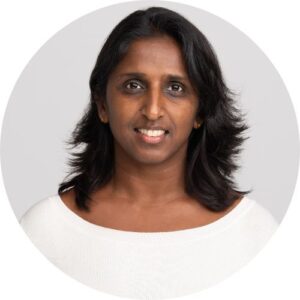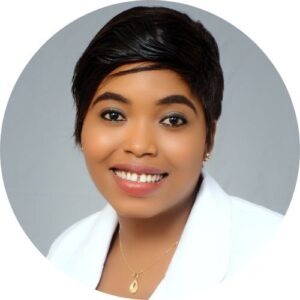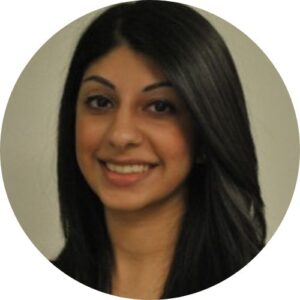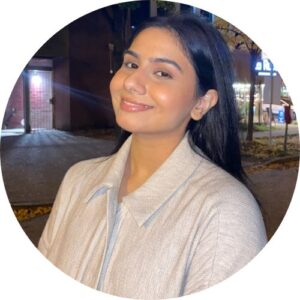In honour of International Women’s Day, we are proud to introduce four outstanding female student representatives from the School of Population and Public Health. These students are committed to driving positive change in the field of population and public health.
This year, in alignment with the 2024 theme #InspireInclusion, the IWD organization asked women to share their perspective on the 2024 theme #InspireInclusion. The theme encourages us to recognize the unique perspectives and contributions of women from all walks of life, including those from marginalized communities.
In the Q&A below, Charuka Maheswaran, Ijeoma Okedo-Alex, Nadia Mithani and Simrat Mahil shared their experiences and insights as women working in the field of population and public health, along with their visions for the future of women in this field.

Dr. Charuka Maheswaran, Public Health & Preventive Medicine Residency Program
Could you tell us about yourself, including your background and research, and why your research is significant?
I am a final-year Public Health and Preventive Medicine Resident. I was born in Sri Lanka, of mixed heritage, at the start of the civil war. My parents took my brother and I to the UK, leaving the rest of our family in Sri Lanka. I grew up in Wales and came to Canada in 2012, where I am raising my young children.
Public health research is wide-ranging and topical. As a public health doctor when faced with an issue, we research, critically evaluate and then synthesise that information into a useable format for the target audience, on the spectrum from individual patients to policy-makers. Public health allows me to be both a scientist and a writer and make a positive difference and finish each day feeling like I made a small contribution to making that day better than the last.
What inspired you to pursue a graduate degree in population and public health?
Public health is all health. It encompasses the land that we live on, the ways we get around, the air we breathe and the water we use. It is individual health from infection to toxin exposure to the ways we interact with each other, society and the system. It allows me to translate specialist knowledge into a general format for the greatest good.
How do you navigate challenges specific to women in public and population health, and what advice do you have for other women facing similar challenges?
There are still very few women in any of the rooms I am in. And even then very few women in positions of influence and power. When there are, they are superlative. The old adage of “you have to be twice as good as they are to get half of what they get” is as true in this situation as it is when it comes to race. Because I am a woman of colour in Canada, a settler-colonial state, the wounds of history and the original sin of this country make a bloody landscape challenging to navigate. As immigrants we are enticed here with promises of utopian proportions, but the reality is shatteringly different. The climb is endlessly uphill and treacherous, but what keeps me going is that every day is a little better. And there are others walking with me, holding my hand, those in behind me urging me on and those in front helping me up. My advice to other women is that none of us do any of this alone. Find your sisters in arms and use their strength in the times when yours fails and give them yours when they need it. Build your village, live in it, use it, contribute to it and it will grow and nurture you.
Can you share a personal experience highlighting the importance of inclusivity and diversity in your research or academic journey?
I am involved in many projects in my line of work and recently we started a new one that mandated we use their “Project charter template”. This document is well established and used throughout the organisation every time a new project is grounded, which is often. Despite this document being ubiquitous and having had the input of several people over time and it being done in a thoroughly sensitive manner, acknowledging the different intersectionalities in existence in our population, race was not an identified specific characteristic. That was surprising to me. I pointed this out and it will be added going forward. It showed me again that representation matters and because “being female” had been already recognised in their table of intersectionality, it omitted that race is also an intersection. Humans are complex being with many parts to our identity and being. Unless different peoples with all their complexities are present and able to speak up and change processes, actions will only be performative.
What are your hopes for the future of women in public and population health, and how do you plan to contribute to this vision?
I note the recent backlash in the progress we are making as a species to recognise all the different facets of our humanity. With any change in the status quo the hegemony leverages lateral violence to keep us fighting with each other and not the system we inhabit. The moves to decenter women and recenter men as the default being, doesn’t align with humanity, which has always needed all of us to provide in our villages and tribes. The many threads that make each of us must be recognised, not cut, but strengthened to make stronger ties to bind us all together. Ties to each other and to our ancestors and our ecosystem is what will provide a better future. I am of mixed heritage and my children are even more so. With every iteration my family becomes more global. I believe that progress is best done when we incorporate ancient ways of thinking into the modern age so that the teachings of our ancestors inform our future knowledge of being. My hope and vision is that we will truly see each other, value the different threads within and use that to guide us to a more inclusive whole of belonging.

Ijeoma Okedo-Alex, PhD in Population and Public Health
Could you tell us about yourself, including your background and research interests, and why your research is significant?
With 14 years of experience since completing medical school and residency training in Public Health/Community Medicine in Nigeria, I have spent my career in public health practice, research, and the provision of primary healthcare services in rural communities. My research interests are health systems and policy, knowledge translation, and women’s health. My focus shifted to healthcare workforce research after a tragic murder of a team member during my first grant project on infectious diseases of poverty with the World Health Organization. This heartbreaking event intensified my commitment to studying violence against healthcare workers in Nigeria for my doctoral research. Giving the pivotal role of healthcare workers, my research aims to contribute valuable insights and solutions, ensuring the safety of these frontliners and promoting resilient and equitable health systems.
What inspired you to pursue a graduate degree in population and public health?
Well, about the penultimate year of medical school, I realized how important in terms of reach and impact promoting public health could be. Rather than just help one patient at a time, I wanted to help more people especially by employing promotive and preventive approaches. Following my residency training and Master’s level training, I aspired to garner skills that would deepen my contributions to solutions to specific challenges within the healthcare system as well as align with my professional goals and a doctoral degree in public health was the answer to this.
How do you navigate challenges specific to women in the field of public and population health, and what advice do you have for other women facing similar challenges?
Coming from a highly patriarchal society, facing challenges as a woman in public and population health is not strange. Although contexts may differ, but these challenges share similarities across climes. One key way I have had navigate this was a commitment to excellence as I had to realise that results consistently help narrow the gap. It is crucial to continuously invest in skill development to stay competitive in the field. Identifying with women’s networks within work organizations or professional community is equally important as these networks offer valuable support, mentorship, and resources. I also believe that women should foster professional allyship with men who believe in them and their dreams. This is in addition to surrounding themselves with supportive family and friends. As a Christian woman, I would also add that remaining true to your faith and convictions regardless of challenges is golden.
Can you share a personal experience that highlights the importance of inclusivity and diversity in your research or academic journey?
Nigeria is a highly diverse society, and this spans geographical regions, ethnicities, culture, language, and religion to mention but a few. Thus, a common experience is to find that for any public health project to work effectively, inclusivity considerations usually reflect in the team mix of researchers or implementers. A personal reflection that comes to mind was a community-level project I led on reducing stigma against women with skin neglected tropical diseases. Conceptualizing this idea was predicated on the fact that the disfigurements from these diseases had significantly more debilitating and psychosocial effects on women and no one was doing anything about it.
I ensured that women and women leaders in the community were adequately represented in the project and its success. While there is still more to be done in terms of diversity and inclusion, we can all intentionally create little stories of change any where we are.
What are your hopes for the future of women in public and population health, and how do you plan to contribute to this vision?
I firmly believe that the future is bright for women in public and population health. Women have the empathy, grit, leadership, and research potentials to promote public and population health. I am eager to see women provide innovative solutions to the teeming public health problems globally with more women sitting at the table in both organizational and research leadership positions in public health. I also want to see women being more supportive of themselves as well as forging partnerships rather than a war where avoidable. I have played and will continue to play my role in making this happen by creating a ripple effect through mentorship to girls and upcoming women leaders and practitioners in public health, linking them to resources and networks and speaking up for their welfare where and when it matters most.

Nadia Mithani, PhD in Population and Public Health
Could you tell us about yourself, including your background and research, and why your research is significant?
I am a second-year PhD student in Public Health with a Bachelor of Science in Food, Nutrition and Health from UBC and a Master of Public Health in Global Health from Simon Fraser University. Before my PhD, I worked for eight years managing a range of public health projects in Canada, Jordan, Uganda, and India. My doctoral research focuses on the acceptability and uptake of HPV-based, cervical self-screening among medically underserved populations such as new immigrants, people with disabilities and individuals without a regular health care provider in British Columbia. Self-screening removes several of the barriers associated with traditional Pap testing and has the potential to improve screening rates for cervical cancer, which is an almost entirely preventable disease. This will help contribute to the eventual elimination of cervical cancer in Canada.
What inspired you to pursue a graduate degree in population and public health?
Five years ago, I developed Steven’s Johnson Syndrome (SJS), a rare, life-threatening adverse drug reaction to an antimalarial medication while conducting research in Uganda. Limited data on SJS suggests a genetic predisposition; however, due to the scarcity of research data, particularly among South Asians, I was advised against future travel to malaria-endemic countries. This experience underscored the need for more inclusive and diversified health research that incorporates race, ethnicity and sex/gender, key determinants of health. In many instances, communities, particularly those historically marginalized, face unique health challenges. Yet, data does not exist to inform tailored healthcare, leading to disease mismanagement and a reduced quality of life. I pursued a PhD in Public Health to acquire skills in study design, statistical methods and knowledge translation that will enable me to shape and produce research that is inclusive of medically underserved populations, and is used to provide high quality, needs-based healthcare.
How do you navigate challenges specific to women in public and population health, and what advice do you have for other women facing similar challenges?
Both in Canada and globally, women’s health programming and research have been and continue to be underfunded and overlooked. Most research informing disease prevention and management guidelines do not account for sex nor gender, despite a variety of diseases that present and impact women differently. Since working in research, I have been fortunate to be surrounded by remarkable women leaders who value my contributions and ideas, provide support and inspiration, and push me to attain my professional and personal goals. My advice to women in population and public health is to seek out such mentors – women you can turn to for guidance and support throughout your career, especially when challenges occur. It is within this environment that you’ll be motivated and thrive.
Can you share a personal experience highlighting the importance of inclusivity and diversity in your research or academic journey?
As a second-generation, South Asian immigrant in Canada, I have witnessed the challenges faced by people living in low- and middle-income countries, as well as the difficulties of immigrating to a new country and starting life over with few resources. The challenges my family faced moving to Canada from East Africa motivated me to pursue higher education and doctoral research, to improve the quality of life of new immigrants and other medically underserved populations who face greater health disparities and disproportionately experience difficulties accessing culturally appropriate healthcare. Cervical cancer is a disease of inequity and tailored approaches to its screening are required to improve access. My research will seek to understand the experiences of different medically underserved groups in participating in HPV-based cervical self-screening and whether it is an acceptable approach.
What are your hopes for the future of women in public and population health, and how do you plan to contribute to this vision?
I admire all the women before me who have had to navigate challenges of gender inequality, discrimination, oppression, and marginalization. Their resilience and determination have paved the way for future generations, ensuring that women like me face fewer barriers and have greater opportunities for success. I believe it is essential for all women, particularly those with intersecting identities, to surround themselves with supportive peers and allies. I plan to contribute to this vision by mentoring trainees and graduates in public and population health, conducting research that is inclusive and representative, and championing women’s health research. By fostering a community of like-minded individuals, we can continue the legacy of inclusion and diversity. Together, we can uplift the next generation of women, through our workplaces, communities, and research endeavours, creating a more equitable and empowering future for all.

Simrat Mahil, Master of Public Health
Could you tell us about yourself, including your background and research, and why your research is significant?
I identify as a Punjabi woman and use she/her pronouns. I am a settler. I was born, raised, and currently reside on the ancestral and unceded xʷməθkʷəy̓əm (Musqueam), sel̓íl̓witulh (Tsleil-Waututh) and sḵwx̱wú7mesh (Squamish) First Nations. I am grateful to be here, committing myself to an ongoing journey of learning and unlearning.
This past September, I began my sixth consecutive year at UBC. I completed my undergraduate degree in Biology, where I learned about the critical intersections between population health and external environments. This led me to pursue a Master of Public Health Degree. Now, in my second year, my interest focuses on outreach, engagement, and inclusivity, particularly within Surrey’s South Asian community. This includes creating strength-based initiatives for LGBTQ+ South Asians, friends, and allies to develop deeper community connections, enhance visibility, and positively impact health and overall well-being.
What inspired you to pursue a graduate degree in population and public health?
My inspiration to pursue a graduate degree in population and public health began with learning about the intricate linkages between environmental factors and human health during my undergraduate degree. This insight deepened my understanding of disparities and challenges in health. More specifically, the turning point came when I observed the lack of inclusivity and representation in health initiatives for LGBTQ+ South Asians.
By pursuing a Master of Public Health degree, I am equipped with necessary skills to develop approaches to address present inequities experienced by my diverse community. Engaging with and understanding community perspectives has been integral to shaping my direction. Reflecting on this honour, I am reminded of the privilege and responsibility that comes. This reinforces my commitment to social justice, equity, and the belief that everyone deserves access to safe health, which respects identity and personal experiences.
How do you navigate challenges specific to women in public and population health, and what advice do you have for other women facing similar challenges?
Navigating unique challenges of women in population and public health has been an important journey of reflection and collaboration. Actively seeking mentorship from women leaders within the field has been critical; their experiences have guided my understanding and offered insight into compassionate, empathy-driven, and inclusive leadership.
Throughout my time at UBC, I’ve been fortunate to build strong networks among peers and allies supporting women in health research. This community has acted as a sounding board, offering diverse perspectives and mutual encouragement in facing challenges. Sharing resources, opportunities, and advice has strengthened the understanding that we are not alone in our experiences.
Embracing self-advocacy has been a crucial part of my journey. Initially daunting, I’ve learned the power of speaking up for myself and upholding values and aspirations. This process of self-advocacy has been empowering and instrumental in my personal and professional growth.
Can you share a personal experience highlighting the importance of inclusivity and diversity in your research or academic journey?
Last year, I co-led a project with UBC’s Community-University Engagement Support Fund and Sher Vancouver—a registered charity supporting Queer South Asian people and allies. The project: “Dosti: Safe Spaces for Vancouver’s South Asian Queer Community,” was developed in partnership with community members based on extensive feedback and knowledge guides. It sponsored a series of strength-based workshops rooted in cultural connectivity, language, and art, finding confluence in South Asian Queerness and transformative traditions.
This experience highlighted the critical importance of inclusivity and diversity in both my research and academic journey. By integrating specific cultural nuances of the South Asian Queer community, we were able to create a program which respected and celebrated diversity. Participants shared how these spaces felt uniquely affirming, providing opportunities to connect, feel inspired and be themselves. This project reinforced my responsibility as a researcher to support inclusivity, ensuring everyone feels seen, heard, and valued.
What are your hopes for the future of women in public and population health, and how do you plan to contribute to this vision?
My vision for the future of women in public and population health is a landscape where diversity and inclusivity are not mere aspirations but tangible realities. This means ensuring the voices of Black, Indigenous, and Racialized women are heard and instrumental in shaping research and academia—experiences that have been dismissed for far too long. This involves a concerted push towards diverse leadership and authentic partnerships, ensuring those perpetually sidelined are now at the forefront of conversations and decision-making.
Also, by fostering safer environments for self-advocacy, we can empower individuals to share unique perspectives and experiences, enhancing collective understanding. I aspire to contribute to this vision by supporting women in public and population health while also actively promoting and participating in initiatives to increase visibility. Through collaboration and intentional advocacy, I hope to help cultivate a more inclusive, supportive network that celebrates and draws strength from diverse experiences.